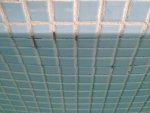Hi,
First: English is not my first language so please excuse my spelling
I have a 15 year old indoor pool, owned by me for 5 years, size 22 m3 (5800 gallons). In March this year, after I got a small leak in my chlorine dispenser, I decided to "upgrade" from chlorine to hydrogen peroxide as my bacteria killer. I emptied the pool and bought the Aseko Asin Aqua Qxygen system to automate the dosing of hydrogen peroxide, pH, algeacide and flocculant. I also installed a UV filter and changed sand with AFM broken glass.
A couple of weeks ago, after 7 months with an empty pool, the Aseko was finally installed with the help of a professional. A week ago from today I filled the pool with water. It took about one day and after that i started the Aseko and pumped in 2,5 liters of hydrogen peroxide and algeacide (standard procedyre). The water was green in the beginning and I'm 99,9 % sure that it was green algea, but after 2-3 days they where gone and the water has been really nice and clear since then. PH stable on 7.3 all week as set by the Aseko. The peroxide ppm is approx. 50 (high).
But... I now have several dark areas in the grout. It's mostly on the pool floor, but also on the walls. I didn't see them before the green water was gone and I don't know when they showed up.
I have tried to remove some of them with a knife (brush didn't help), but the dark spots sits really deep in the grout and I had to stop "digging" before I removed all the grout.
I read somewhere that the black algea can also grow in empty pools and can have quite deep roots so my best theory is that the spots are black algea, but I'm not sure at all. The company that installed the Aseko are not sure either, they have no experience with pools with tiles, only fiberglass pools.
Attached is a picture of one the bigger dark areas sitting on the wall just below the waterline. As you can see there is also small dark dots in the grout but I'm not sure if it's the same thing.
Could it be anything other than black algea? And is it possible to remove it without removing all the grout?
Thanks!
First: English is not my first language so please excuse my spelling
I have a 15 year old indoor pool, owned by me for 5 years, size 22 m3 (5800 gallons). In March this year, after I got a small leak in my chlorine dispenser, I decided to "upgrade" from chlorine to hydrogen peroxide as my bacteria killer. I emptied the pool and bought the Aseko Asin Aqua Qxygen system to automate the dosing of hydrogen peroxide, pH, algeacide and flocculant. I also installed a UV filter and changed sand with AFM broken glass.
A couple of weeks ago, after 7 months with an empty pool, the Aseko was finally installed with the help of a professional. A week ago from today I filled the pool with water. It took about one day and after that i started the Aseko and pumped in 2,5 liters of hydrogen peroxide and algeacide (standard procedyre). The water was green in the beginning and I'm 99,9 % sure that it was green algea, but after 2-3 days they where gone and the water has been really nice and clear since then. PH stable on 7.3 all week as set by the Aseko. The peroxide ppm is approx. 50 (high).
But... I now have several dark areas in the grout. It's mostly on the pool floor, but also on the walls. I didn't see them before the green water was gone and I don't know when they showed up.
I have tried to remove some of them with a knife (brush didn't help), but the dark spots sits really deep in the grout and I had to stop "digging" before I removed all the grout.
I read somewhere that the black algea can also grow in empty pools and can have quite deep roots so my best theory is that the spots are black algea, but I'm not sure at all. The company that installed the Aseko are not sure either, they have no experience with pools with tiles, only fiberglass pools.
Attached is a picture of one the bigger dark areas sitting on the wall just below the waterline. As you can see there is also small dark dots in the grout but I'm not sure if it's the same thing.
Could it be anything other than black algea? And is it possible to remove it without removing all the grout?
Thanks!


